Introduction: The Power of Combining Travel and Meditation

At the intersection of travel and meditation lies a profound opportunity for self-discovery. When individuals embark on journeys that take them beyond the comfort of their familiar environments, they are inevitably faced with new perspectives, cultures, and challenges that ignite personal growth. Combine this with the reflective, centering power of meditation, and the journey transcends mere sightseeing—it becomes a quest for inner peace and deeper understanding of the self.
But why is travel such a potent catalyst for self-discovery? And how can meditation deepen the experience, making it a transformative process? In a fast-paced, globalized world where people are searching for purpose and meaning, the synergy between travel and meditation offers an accessible path to not only exploring the world but also uncovering truths within.
In this article, we will explore the dynamic connection between meditation and travel, how it catalyzes self-discovery, and how integrating meditative practices while traveling can lead to lasting inner peace. By deconstructing conventional assumptions about travel and introducing forward-thinking insights on meditation’s role, we offer a roadmap to unlocking both personal and spiritual transformation.
The Role of Travel in Personal Growth and Self-Discovery
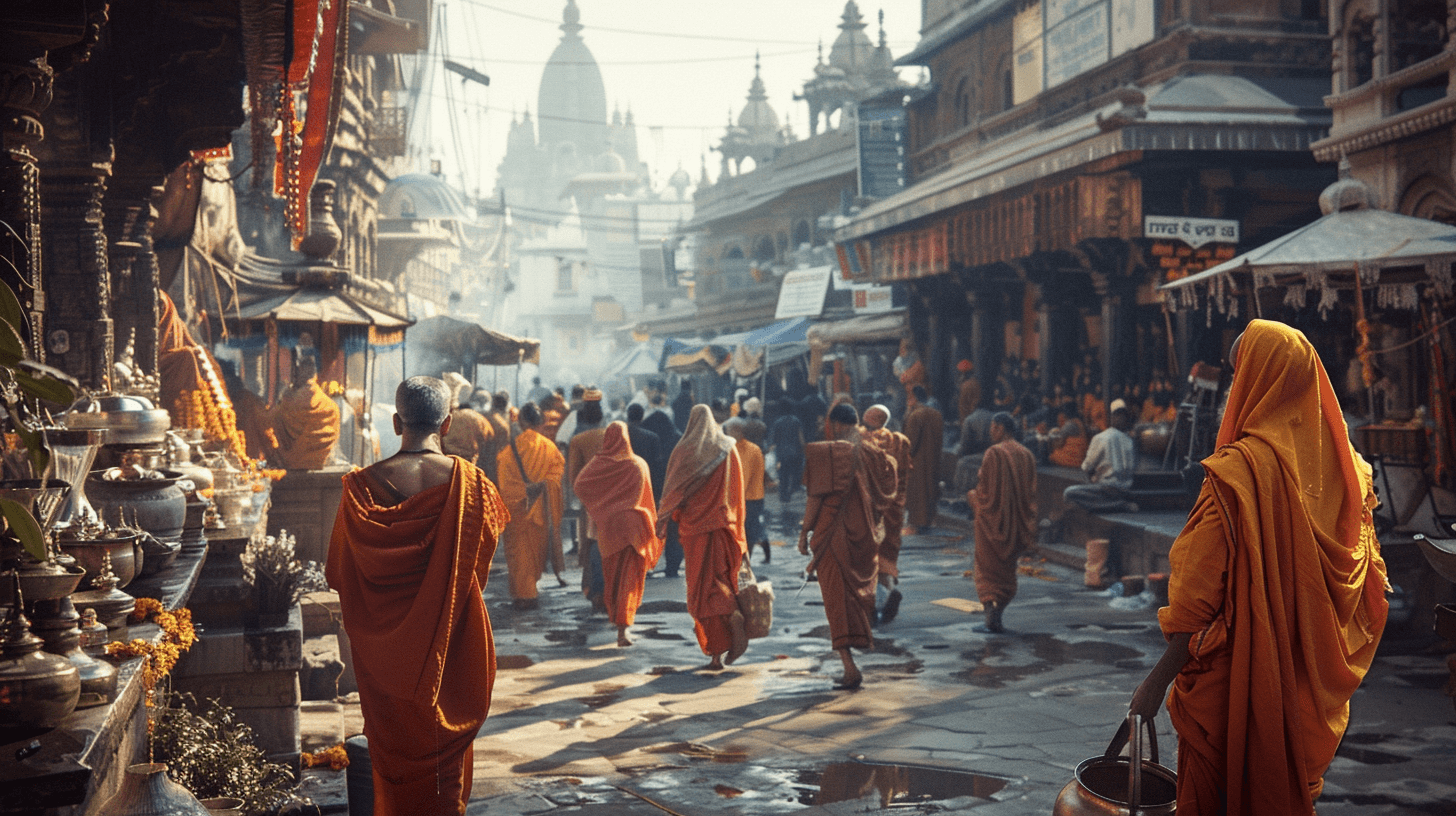
Travel has long been romanticized as a path to adventure, escape, and exploration. But at its core, travel is not merely about visiting new places—it’s about changing the way we perceive the world and ourselves. For centuries, spiritual seekers have journeyed to sacred places, immersing themselves in the unfamiliar to discover hidden truths.
Travel as a Catalyst for Change
When we step outside our comfort zones and leave behind the routines of daily life, we open ourselves to change. Travel disrupts habitual thinking patterns, forcing us to engage with novel experiences, people, and ideas. These disruptions, while sometimes uncomfortable, prompt personal growth by making us reconsider who we are in relation to the world.
As we navigate foreign landscapes, we are also navigating inner landscapes. New environments push us to confront our assumptions, fears, and desires, leading to insights that wouldn’t be possible within the familiar confines of home.
Cultural Immersion and Spiritual Exploration
Immersing ourselves in different cultures, particularly those with strong spiritual traditions, deepens our understanding of life’s many facets. From Buddhist monasteries in the Himalayas to shamanic ceremonies in Peru, spiritual experiences during travel often challenge ingrained cultural conditioning, opening up possibilities for deeper introspection.
These encounters force us to question preconceived notions about identity, success, and meaning, making room for spiritual exploration and growth. Whether it’s participating in a traditional Japanese Zen tea ceremony or attending an indigenous wisdom retreat, these cultural exchanges can become catalysts for profound self-reflection and transformation.
Key Destinations for Spiritual Travel
Certain destinations hold powerful energy that attracts travelers seeking not just adventure, but spiritual awakening. Places like Bali, India (Rishikesh), Peru (Sacred Valley), and Thailand (Chiang Mai) have become havens for spiritual seekers due to their rich cultural traditions, natural beauty, and prevalence of meditation retreats.
These destinations are not merely tourist attractions—they are spiritual epicenters where the environment itself encourages a shift in consciousness. The journey to these places becomes an opportunity to realign with one’s inner purpose.
Meditation as a Tool for Self-Discovery
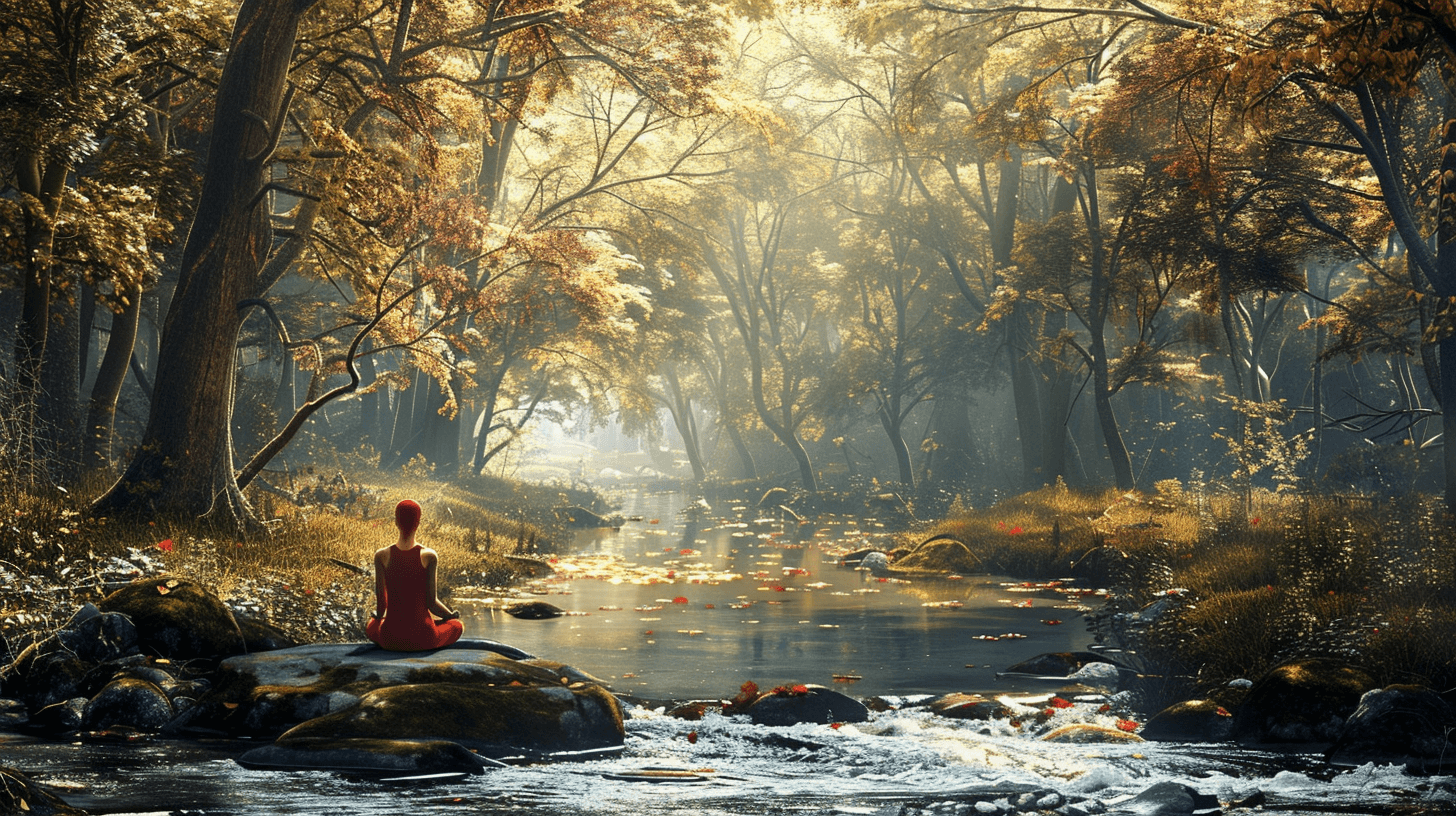
Meditation is an ancient practice with profound implications for modern life, especially when integrated with travel. While travel challenges external perceptions, meditation enables us to navigate our internal world. Combining the two provides a unique, holistic approach to self-discovery.
The Science Behind Meditation and Self-Discovery
Recent advances in neuroscience have shown that meditation not only relaxes the mind but also restructures it. By altering brainwave patterns—shifting from beta (associated with active thinking) to alpha, theta, and even delta waves—meditation creates a state of mental stillness, making it easier to access deeper layers of consciousness.
Brainwave states like theta are associated with creativity, insight, and emotional healing. These altered states allow us to bypass the constant chatter of the analytical mind, giving us the space to reflect on our life experiences and uncover hidden truths about ourselves.
Types of Meditation Ideal for Travel
Travel offers opportunities for mindfulness, and meditation enhances those experiences by helping us process what we encounter. While on the move, mindfulness meditation, breathwork, and body scan practices are ideal. They don’t require elaborate setups or long periods of stillness and can be practiced in diverse environments, whether waiting in an airport or resting by a beach.
Through these simple but powerful practices, travelers can stay grounded and centered, making the experiences of travel more meaningful. The ability to observe thoughts and feelings without judgment creates space for self-reflection, which is essential for self-discovery.
Meditation Practices for Travelers
A portable meditation practice is key. Start with brief sessions during travel transitions—such as taking deep, mindful breaths on a plane or train—or find a quiet spot in nature. Sacred natural sites offer unique opportunities for grounding and contemplation.
Carrying a travel journal can complement meditation by providing a space for reflection. After meditating, use the journal to capture insights, emotions, or moments of clarity.
Spiritual Retreats and Meditation Travel Experiences
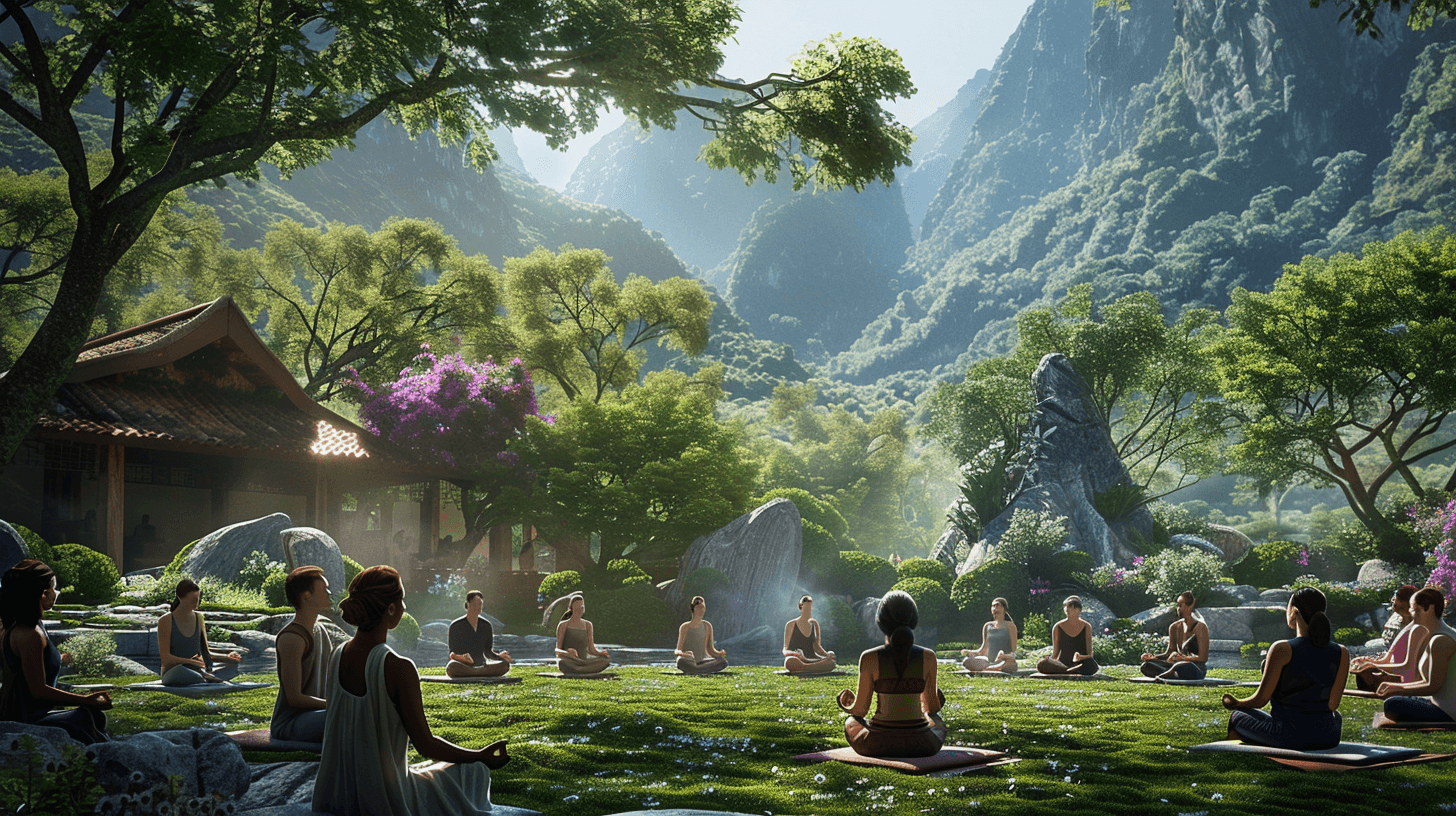
While spontaneous meditation during travel can yield great benefits, structured spiritual retreats take the experience of self-discovery to a new level.
Choosing the Right Retreat
When selecting a meditation retreat, it’s important to find one that aligns with personal values and spiritual goals. Retreats range from silent meditation programs to immersive spiritual workshops, and the best retreats often combine elements of both meditation and community engagement.
Factors to consider include the retreat location, the focus of the program (whether it’s mindfulness, energy healing, or deep spiritual exploration), and the overall environment. A strong connection between nature and meditation practice can enhance the experience.
Popular Global Destinations for Meditation Retreats
India: Home to spiritual traditions like Yoga and Vedanta, India offers retreats that focus on deep meditation practices such as Vipassana and Transcendental Meditation. Rishikesh, known as the birthplace of yoga, is a particularly strong draw for seekers.
Peru: The Sacred Valley and Machu Picchu, with their rich mystical heritage, have become spiritual pilgrimage sites. Many retreats here combine meditation with indigenous healing practices.
Bali: Known as the Island of the Gods, Bali offers a serene backdrop for mindfulness and meditation. The island’s deep-rooted spirituality and emphasis on balance between body and mind create the ideal environment for self-exploration.
Thailand: Chiang Mai and Koh Phangan are two popular retreat destinations in Thailand, known for their spiritual programs that blend Buddhist practices with personal development.
The Science Behind Meditation and Consciousness Expansion

Brainwave States and Consciousness
In our typical waking state, the brain primarily operates in beta waves, which are associated with active thinking, problem-solving, and alertness. Beta waves are fast and high-frequency, keeping the mind engaged in logical thought processes and decision-making. However, during meditation, the brain shifts into slower frequencies such as alpha, theta, and delta waves, which are closely linked to relaxation, creativity, and heightened states of consciousness.
Alpha Waves: Alpha waves are slower than beta waves and are often produced during light relaxation or the early stages of meditation. This state is linked to a calm, relaxed focus where the mind is open to creativity and new insights. Alpha waves often emerge when you’re daydreaming, reflecting on past experiences, or engaging in light meditation. For travelers seeking mental clarity, alpha states foster a reflective mood that can help them process the emotional or psychological impact of new environments or life changes.
Theta Waves: Theta waves, which are even slower, appear during deeper meditative states and light sleep. These waves are associated with creativity, intuition, and deep relaxation. In meditation, theta states allow individuals to tap into the subconscious mind, where many of our beliefs and patterns are stored. For someone traveling and meditating, theta waves can enhance self-discovery by allowing access to subconscious emotions and insights. In this state, travelers may gain new perspectives on their life journey or find deeper meaning in their travel experiences.
Delta Waves: Delta waves are the slowest brainwaves and typically occur during deep sleep. However, advanced meditators can access delta states while awake, achieving profound stillness and deep peace. For those on a path of self-discovery, delta waves facilitate a connection to higher consciousness, promoting a deep sense of oneness and inner stillness.
The shift from beta to these slower brainwave frequencies through meditation creates a mental state conducive to self-reflection and emotional processing. For travelers, this altered consciousness can be particularly beneficial. Whether contemplating life’s purpose or reflecting on transformative travel experiences, these brainwave states create the mental space necessary for profound insights to arise.
Neuroplasticity and Spiritual Awakening
Neuroplasticity refers to the brain’s remarkable ability to rewire itself in response to experiences and stimuli. Meditation has been shown to significantly impact this process by strengthening neural pathways associated with self-awareness, emotional regulation, and empathy, while weakening those tied to stress, anxiety, and negative thinking. Regular meditation enhances the prefrontal cortex (responsible for decision-making and self-awareness) and reduces the size and activity of the amygdala (linked to stress and fear).
In terms of spiritual awakening, neuroplasticity allows individuals to integrate the insights gained from meditation and travel into long-term personal growth. For example, as one meditates during travel, the brain creates new pathways that support emotional resilience, a sense of inner peace, and an expanded worldview. Over time, these changes become more ingrained, leading to lasting spiritual and personal transformation.
For travelers, the neuroplastic effects of meditation can help cement the lessons and insights gained from their journeys, allowing them to return home with a deeper sense of self and purpose. Meditation coupled with travel accelerates the formation of new neural networks that promote self-discovery, spiritual growth, and a greater understanding of the world.
Hormonal and Emotional Balance
One of the most immediate benefits of meditation is its ability to regulate hormones, particularly cortisol and serotonin.
Cortisol, known as the stress hormone, is produced in response to anxiety, fear, and high-pressure situations. Chronic stress can lead to elevated cortisol levels, contributing to emotional instability, anxiety, and depression. Meditation has been shown to lower cortisol levels, which promotes relaxation and a sense of calm. For travelers, who may face unfamiliar environments and stressful situations, meditation can serve as a tool to manage cortisol and maintain emotional equilibrium.
Serotonin, on the other hand, is often referred to as the “happiness hormone.” Increased serotonin levels lead to improved mood, emotional stability, and a greater sense of well-being. Meditation naturally boosts serotonin production, which fosters a positive mental state, making it easier for individuals to engage in self-reflection and personal growth.
This hormonal balance is essential for emotional stability and self-reflection. When stress is reduced and mood is elevated, the mind is more open to introspection and self-awareness. For travelers, this balance allows them to process new experiences without feeling overwhelmed, facilitating a deeper sense of peace and inner discovery.
In addition, meditation’s impact on the parasympathetic nervous system—which controls relaxation responses—promotes a state of calm and recovery. This emotional and physiological balance is crucial for integrating the spiritual and psychological insights gained from travel. When travelers incorporate meditation into their journeys, they create an inner sanctuary where they can process their experiences, learn from them, and move closer to a state of inner peace and higher consciousness.
By nurturing hormonal balance, emotional well-being, and neurological growth, meditation offers travelers a powerful tool to turn their outer journeys into profound inner transformations.
Exploring Meditation and Consciousness Across Different Spiritual Traditions
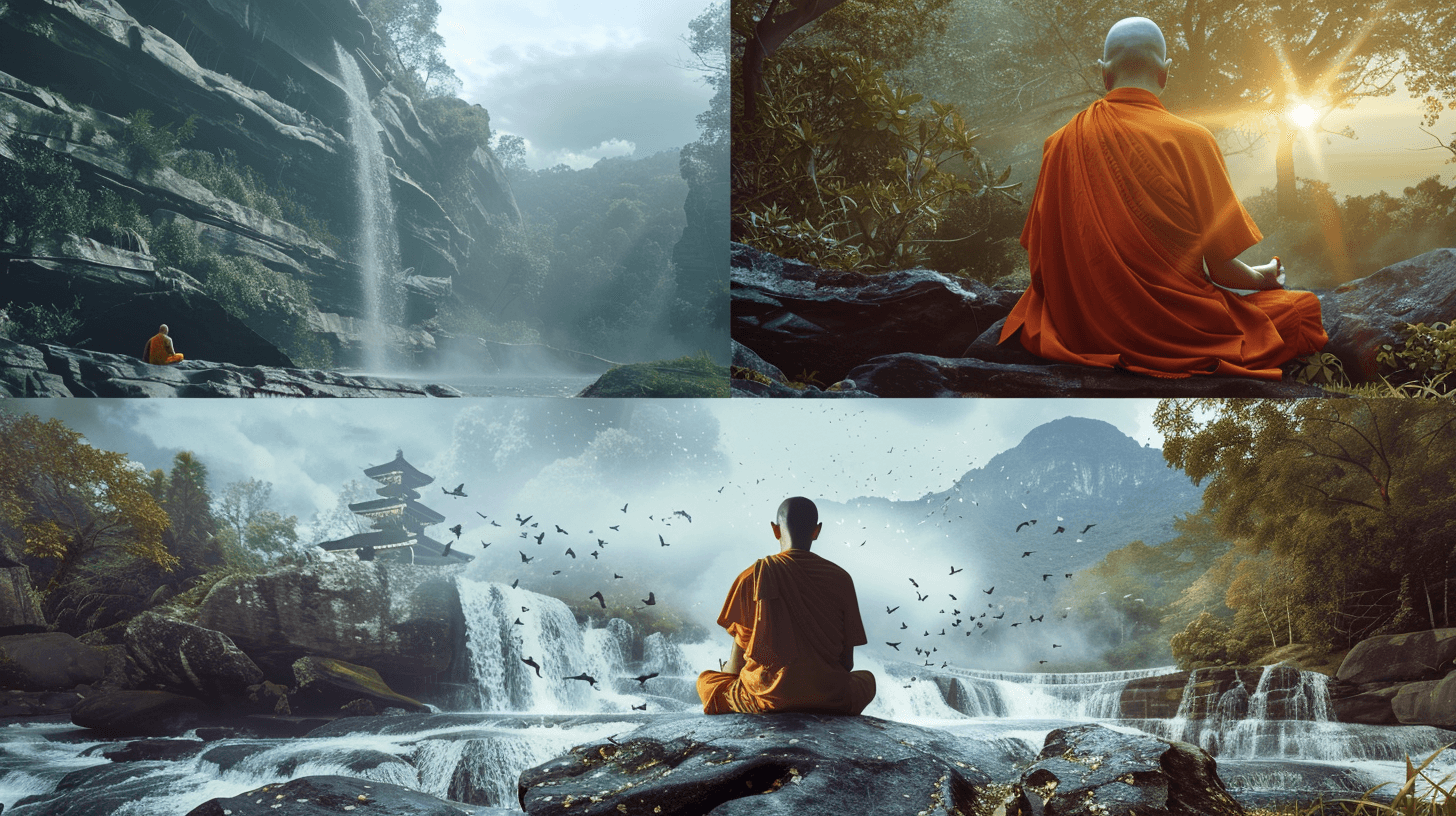
Buddhism
Buddhism places meditation at the heart of its spiritual practice, particularly as a tool to transcend suffering and achieve enlightenment. Vipassana, often translated as “insight meditation,” focuses on deep observation of the mind and body, teaching practitioners to observe thoughts, sensations, and emotions without attachment. This practice fosters a state of non-judgmental awareness, where individuals can step outside their egoic tendencies.
By repeatedly witnessing the mind’s tendencies without clinging to emotions or judgments, practitioners transcend egoic identification. In the context of self-discovery, Buddhist meditation offers travelers a profound opportunity to explore their inner landscapes. Traveling often brings new experiences and challenges, and the practice of Vipassana helps individuals process these experiences without being overwhelmed, fostering inner stillness amid external movement. Buddhist meditation also highlights Anicca (impermanence), a fundamental concept that allows individuals to see the transient nature of thoughts and emotions, which can deepen one’s understanding of the self in relation to the world.
Buddhism also introduces the concept of Sunyata (emptiness), which involves the dissolution of all fixed notions of self. In this way, meditation in Buddhism isn’t about becoming a “better” self but understanding that the self is a fluid, impermanent phenomenon. This understanding brings inner peace and a deeper connection with higher consciousness.
Hinduism
In Hinduism, meditation serves as a spiritual technology for self-realization, particularly through practices like Raja Yoga and Kundalini meditation. Raja Yoga, also known as the “Royal Path,” includes systematic techniques such as breath control (Pranayama), concentration, and meditation aimed at disciplining the mind and senses, ultimately leading to spiritual liberation, or Moksha.
Kundalini meditation is a more esoteric practice in which dormant spiritual energy (Kundalini) is awakened and rises through the seven chakras, aligning and energizing them. As this energy ascends through the spine, it purifies the practitioner’s mind and body, leading to states of heightened consciousness and Samadhi, or unity with the divine. Kundalini’s rising also clears emotional and psychic blockages, helping individuals discover their true spiritual identity.
For those traveling or experiencing new environments, the practice of Raja Yoga and Kundalini offers a way to ground oneself and cultivate inner awareness despite the outer chaos. Awakening and balancing the chakras through these meditative practices can also be a pathway for travelers to deepen their self-discovery journey, as it connects them with their inherent spiritual energy and divine potential.
Taoism
Taoist meditation is rooted in the idea of aligning oneself with the Tao, the fundamental principle that underlies the universe. In Taoist practice, meditation is a way to cultivate stillness (Wu Wei), an effortless state of action that allows individuals to align with the natural flow of life. Taoist meditation techniques, such as Zuo Wang (sitting and forgetting), focus on quieting the mind and merging individual consciousness with the Tao. This is often achieved through visualization, breath control, and focusing on the flow of energy (Qi) within the body.
Taoism’s concept of Yin and Yang also plays a crucial role in understanding self-discovery through meditation. The philosophy suggests that true wisdom and enlightenment come from balancing opposing forces—such as light and dark, masculine and feminine, activity and rest—within oneself. For travelers, engaging with Taoist meditation practices helps cultivate mental harmony, allowing them to accept life’s challenges and changes with ease. Taoism emphasizes that self-discovery happens not by controlling life but by flowing with it, helping individuals connect with their true, balanced nature.
Western Mysticism
In the realm of Western spirituality, meditation practices from Christian mysticism and Kabbalistic traditions focus on union with the divine. Christian mysticism encourages contemplative prayer, where meditation becomes an avenue for deepening the individual’s relationship with God. The practice involves a quiet, focused devotion where individuals empty their minds of distractions to experience divine presence directly.
The Christian mystical tradition includes figures like St. Teresa of Avila and St. John of the Cross, whose meditative practices focused on reaching higher states of consciousness through surrender and divine love. In this tradition, self-discovery happens when the individual lets go of the egoic self and realizes a deeper spiritual identity rooted in love and connection with the divine.
Similarly, Kabbalistic meditation involves the use of sacred texts, chants, and focused contemplation to gain access to higher levels of consciousness and divine wisdom. The Tree of Life, a central symbol in Kabbalah, represents the interconnectedness of all things and serves as a roadmap for spiritual growth. Meditation in this context is not just a means of personal transformation but a way of aligning with the greater cosmic order. For travelers, who are often seeking new meanings and connections, these Western mystical practices offer a profound avenue for self-discovery through divine alignment.
How to Integrate Meditation into Daily Life for Lasting Change
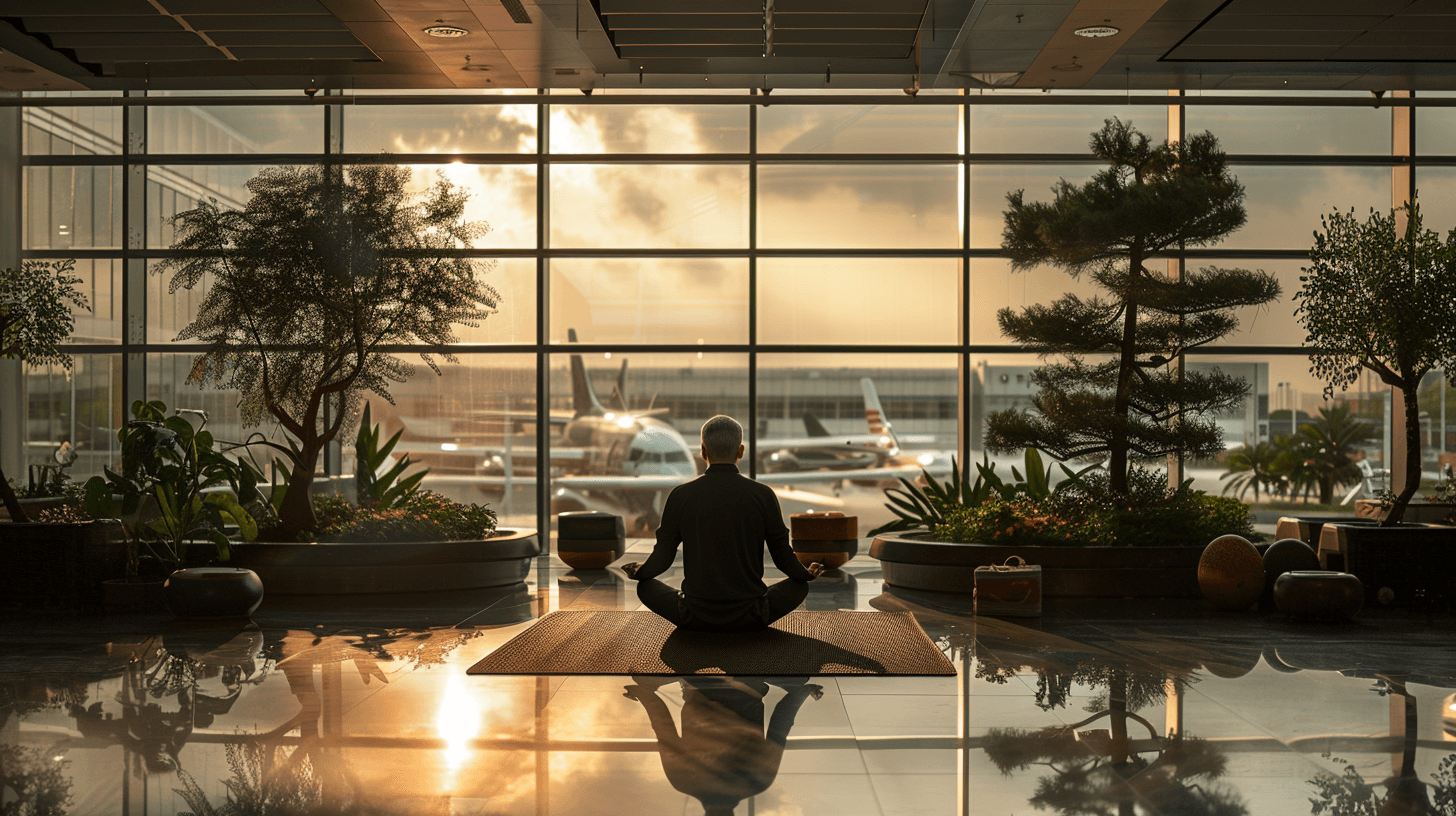
Consistency and Daily Habits
Consistency is the foundation upon which any successful meditation practice is built. While it might seem challenging, the key is to start small—perhaps with just 5 to 10 minutes each day—and gradually increase the time as you build discipline. Travelers and busy individuals, in particular, can benefit from short but impactful sessions. The brain thrives on regularity, and over time, daily practice rewires neural pathways, reinforcing calm and mindful awareness.
When establishing a routine, it’s essential to create a sacred space for meditation. This space can be as simple as a corner of a room, a yoga mat, or even a spot outdoors where distractions are minimized. For travelers, this space might be ever-changing, but the intention remains the same: to create a mental sanctuary, no matter where you are. By bringing along a meaningful object like a small candle, crystal, or a journal, you can recreate the feeling of that sacred space wherever you go.
The key to consistency is to not view meditation as a chore but as an opportunity to connect with your inner self. Set a specific time each day—morning, afternoon, or before bed—to meditate. Studies suggest that routines help establish habitual neural patterns, which allow mindfulness and inner peace to become second nature. Moreover, maintaining this practice while traveling can anchor you during times of change and unpredictability.
Mindful Living
Mindfulness is not confined to sitting meditation sessions; it is a way of life that involves bringing conscious awareness into everyday activities. Whether eating, walking, or having a conversation, mindful living requires being fully present in the moment. The concept of mindfulness stems from ancient Buddhist traditions but has been adopted by many modern wellness practices due to its effectiveness in reducing stress and enhancing well-being.
For example, when eating, instead of rushing through meals while multitasking, you can turn this daily activity into a form of meditation by eating mindfully—noticing the textures, flavors, and sensations involved. Likewise, walking meditation, which is a form of mindfulness, encourages individuals to slow down and observe each step, the feeling of their feet against the ground, and the world around them. This practice integrates movement with awareness, making it perfect for travelers who are often navigating new environments.
Another powerful way to practice mindful living is through deep listening during conversations. Instead of thinking about what you’re going to say next or being distracted by your phone, focus entirely on the person speaking. This fosters deeper connections with others and cultivates a sense of compassion and understanding.
Mindfulness also extends to how you handle emotions. Instead of reacting impulsively to stress or negative experiences, mindfulness allows you to observe your emotions without judgment, creating space for more conscious responses. This practice leads to emotional resilience, which is invaluable when navigating the uncertainties of life and travel.
Integrating meditation and mindfulness into your life doesn’t require drastic changes or hours of practice. It’s about small, consistent efforts that align your actions with conscious awareness, ultimately transforming not just how you meditate but how you engage with the world around you. The more mindful you become in your everyday actions, the deeper the benefits of meditation will permeate your daily life, helping you cultivate lasting inner peace and higher consciousness.
Conclusion: Embarking on Your Journey Toward Higher Consciousness

The transformative power of combining meditation with travel lies in its ability to foster deep self-discovery. As you explore new environments, cultures, and experiences, meditation serves as the anchor that grounds you, providing the mental and emotional clarity necessary to process these external stimuli. The practice of mindfulness and meditation offers a unique pathway to turn travel into more than just an outward journey—it becomes a powerful inward exploration.
Throughout this article, we’ve explored how travel disrupts habitual thought patterns and offers fertile ground for personal growth, while meditation allows access to deeper layers of consciousness and introspection. Whether through structured spiritual retreats or simple moments of mindfulness while exploring the world, this combination offers a holistic approach to self-realization and peace.
By cultivating daily meditation practices, embracing mindful living, and integrating meditation into travel experiences, you can create lasting change. Meditation rewires the brain, balances emotional and hormonal responses, and enhances your ability to reflect on life’s purpose. As you deepen your awareness through travel, you not only discover new places but also unlock insights that transform your understanding of yourself.
The journey of self-discovery is ongoing, and both travel and meditation are valuable tools to keep you on this path. Each moment spent in stillness, reflection, or exploration is an opportunity to uncover more layers of truth, purpose, and inner peace. The road to higher consciousness and self-awareness is not a final destination—it’s a lifelong adventure, one that begins with a single step and a mindful breath.
Embrace this transformative journey, knowing that both the outer world and your inner self hold limitless opportunities for growth and enlightenment.








